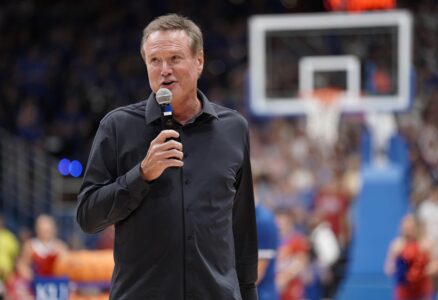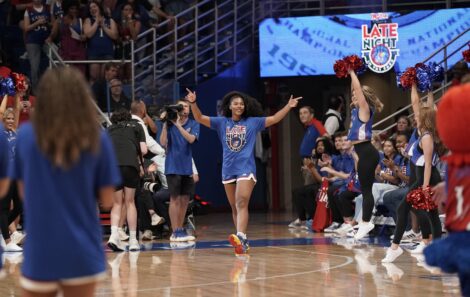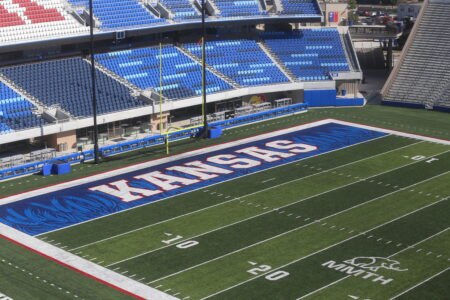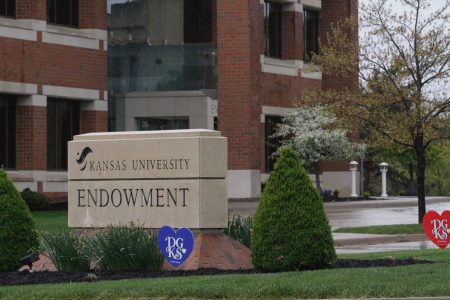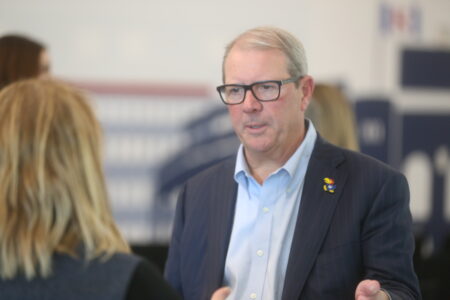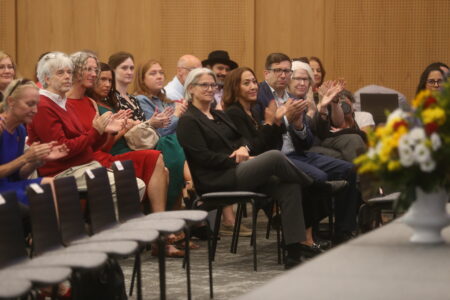Gene Budig, former KU chancellor, president of American League baseball, dies at 81

photo by: Contributed/KU Endowment Association
Gene Budig was the 14th chancellor at the University of Kansas.
Updated at 3:01 p.m. Tuesday
One of the longest-tenured chancellors at the University of Kansas, and the man credited with much of the modern growth of the state’s flagship university, died Tuesday morning at the age of 81.
Gene Budig took over at KU in 1981 after a career as a university administrator at Illinois State University and West Virginia University, serving as a major general in the Air National Guard and working as a newspaper reporter in his hometown of Lincoln, Neb.
During Budig’s 13-year tenure leading KU, he oversaw the construction of the Dole Human Development Center, the Lied Center for the Performing Arts, the Adams Alumni Center and the KU Vietnam Veterans Memorial; he spearheaded a fundraising drive that was the largest in university history at that time, raising $265.3 million over five years and upping the level of annual giving to KU from roughly $12 million to $34.6 million; and he led KU to its then-highest enrollment ever at just over 29,000 students in 1992.
In June 1991, Hoch Auditorium — built in 1927 as the home of Kansas’ men’s basketball team until Allen Fieldhouse opened in 1955 — was struck by lightning just days before it was scheduled to be retrofitted with lightning rods. A devastating fire resulted, and Budig was described as instrumental in securing an $18 million grant from the state of Kansas to rebuild the historic structure.
When the building was officially dedicated in October 1997 — three years after Budig retired as KU chancellor — it was renamed in his honor, and it now includes multiple thousand-seat lecture halls where the university’s largest classes are held each day.
Budig was born on May 25, 1939, and was adopted from an orphanage shortly after birth. He grew up in McCook, Neb. He earned three degrees at the University of Nebraska — a bachelor’s in journalism in 1962, a master’s in English in 1963 and a Ph.D. in education in 1967.
He worked as a reporter and editorial writer for The Lincoln Star and Lincoln Journal while attending school and then worked as an administrative assistant to Nebraska’s governor. In 1967, Budig became an assistant professor of educational administration at Nebraska, and he later held roles as a full professor, an assistant vice chancellor and a public affairs administrator.
He moved to Illinois State in 1972 as a vice president, dean and professor of educational administration and its youngest full professor. He became acting president in 1973 and president later that year.
Before being hired as KU’s chancellor, Budig also served as president of West Virginia University starting in 1977.
Despite his years of working in academia, it was always clear that Budig’s first love was baseball. He was once quoted in the Journal-World saying, “I had great ambition to be a professional baseball player. Unfortunately, I couldn’t hit, I couldn’t field, but I was fast and that has, by the way, served me very, very well for many years in academic administration.”
According to an article written by KU History, it didn’t come as too much of a surprise when Budig retired from the university in 1994 to take what he would call his dream job: a gig at the top of Major League Baseball. Budig was friends with then-MLB Commissioner Bud Selig, who asked the KU chancellor to be the president of the American League.
It was a largely ceremonial role that Selig actually dissolved when he reorganized baseball operations in 2000, meaning Budig also was the last person to ever hold the position. When the job was eliminated, Budig became one of Selig’s senior advisers and also served as a part owner of the Charleston RiverDogs — a minor league affiliate of the New York Yankees — since 2006.
Even while at KU, however, Budig had opportunities to show off his sports savvy. In 1988, when many prominent alumni were clamoring for the program to hire a big name to succeed Larry Brown as men’s basketball coach, Budig instead backed someone who had never been more than an assistant in college: Roy Williams, a future Hall of Famer.
“Ol’ Budig knew a little something,” the professor liked to say about many subjects, with a wry smile.
Budig remained close to Williams and they were part of a regular breakfast gathering in the Charleston area that featured present and past coaches in college basketball and football.
In a campus message Tuesday morning, current KU Chancellor Douglas Girod said the university community should take some time to reflect on Budig’s impact at KU, a place he considered to be home.
“While we are saddened by Chancellor Budig’s passing, we can be grateful for the opportunity to celebrate his life and contributions to KU,” Girod said. “Gene — we promise to look after your home in your absence.”
In a statement, current Major League Baseball Commissioner Rob Manfred praised Budig’s contributions not only to the sport of baseball but to thousands of university students as well as the U.S. Air Force.
“Dr. Budig took great pride in his role as American League President, and continued to be in the game as part-owner of the Charleston RiverDogs. We appreciate his impact on students, his service to the Air National Guard, and his lifelong connection to our National Pastime,” Manfred said in the statement. “On behalf of Major League Baseball, I send my deepest condolences to his wife Gretchen, their family, and his friends throughout our game.”
Budig is survived by his wife, Gretchen Van Bloom Budig; his three children, Christopher Budig (Trisha Petite), Mary Frances Budig (John Hass), Kathryn Budig (Kate Fagan); and his five grandchildren, Regan, Jack and Nicholas Budig and Alexander and Georgia Hass; his sister, Mary Ann Myers, and his brother, Richard Budig. He was preceded in death by his parents, Angela and Arthur Budig.
Funeral arrangements will be handled by the McAllister-Smith funeral home near Charleston, S.C.
Contact Conner Mitchell
Have a story idea, news or information to share? Contact KU reporter Conner Mitchell:
- • Email: cmitchell@ljworld.com
- • Other: Tip form/Signal contact
- • Phone: 785-832-6388
- • Twitter: @ConnerMitchell0
More Lawrence Journal-World coverage of the University of Kansas


